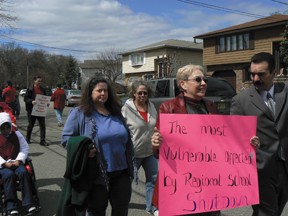The state’s child welfare department has announced plans to close all 18 special needs schools in the state, including one in Secaucus that serves the severely disabled and children with behavioral problems from throughout Hudson County. The plan is part of a state effort to restructure the education system for these students.
The first round of school closures will take place in June, when five schools are slated to shut down. Another round of closures will take place in September.
“This announcement was just dropped on us one day in a conference call,” said school Principal Donna Morse on Tuesday. “I expect a call any day telling us when they’re going to shut us down.”
Assemblyman Vincent Prieto (32nd Dist.), whose district includes Secaucus, said last week he believes the school will likely close sometime next year.
The school primarily accommodates children, teens, and young adults with severe developmental disabilities. A handful of other students with a history of emotional and behavioral problems, who have been removed from their homes, attend the regional school while living in a halfway house in Kearny.
The student body comes from Secaucus, North Bergen, Union City, Jersey City, Weehawken, and other towns in Northern New Jersey.
Currently, the school has 40 students, although it has the capacity to accommodate as many as 90. Students range in age from 3 to 21.
Will go to their own districts
Under the state plan, these students will receive services and will be educated in their home districts. The New Jersey Department of Children and Families (DCF), which oversees the schools, has said the closures are necessary due to declining enrollment.
“This move was not a budget decision, although I know some people believe that,” said Kate Bernyk, a DCF spokesperson. “We’ve been seeing declining enrollment over the last several years. This is an effort to react to the decreased enrollment and transition these children back to their districts, where their needs can be served just as well as they are currently.”
She also noted that DCF is not legally or legislatively mandated to care for the children who attend the regional schools. By transitioning them back to their home districts DCF, Bernyk said, can “streamline our services so we can focus on the core function of the department…We understand parents’ concerns. As individual schools start closing we’ll be working closely with them to talk through how the transition will work. We’re working with the local school districts and the Department of Education to make sure that these kids’ educational needs are being met.”
Families concerned
But parents fear most school districts are not staffed or equipped to handle their children’s special needs. On Tuesday, about 60 parents, students, and teachers staged a protest outside the school in Secaucus to demonstrate the anticipated closure.
“Before my daughter came to this school, she was very hyper and easily rattled,” said Secaucus resident Julia Branda whose daughter, Janna Rose, graduated from the school last year. “But she became much calmer when she came here. The teachers were very patient and really took the time to get to understand how she functioned, how she behaved. Every student got individualized attention.”
Branda believes her daughter, who is wheelchair-bound, nonverbal, and has the mentality of a 2-year-old, would not have been well-served in a different setting.
Esther Figueroa of Weehawken, whose son, Casey, attends the school, agreed.
“When my son first came here, he was unaware of his surroundings,” she said. “I could enter a room and he wouldn’t know I was there. Now, he will acknowledge you if he sees you. He can interact with people much more than he used to. There are many challenges that he’s been able to overcome. If he had attended some school in our district, my fear is they would have just stuck him in a room somewhere, and he would have never progressed.”
North Bergen resident Solange Ryan added that the regional schools offer a year-round program, while most other public schools are in session for 10 months, a distinction she believes will cause her daughter, Rebecca, to regress during months when school is not in session.
“We service children who cannot function in a regular public school system,” said Marianne Reef, a teacher who has worked at the Secaucus regional school for more than 25 years.
Students who are part of the school’s “teen crisis” program are also concerned.
“Basically, we have nowhere to go if this happens to us, because some of the kids here have already been kicked out of their old schools and some kids live permanently in the group home,” said student Desiree Mistretta of Fairview. “The teachers here help us a lot. More than anyone has ever helped us.”
State responds
“We’ll be working with the local school districts and the Education Service Commission to identify alternative placement for these students,” Bernyk said. “The regional schools aren’t necessarily the only placement available for those kids.”
She said there will not be a “one size fits all approach to placing children.” Some students may be placed in the local public school system, but other students may be educated by nonprofits or other agencies if that makes better sense, she said.
Meanwhile, advocates for the school are hoping for a last-minute deal to prevent the closures.
Assemblyman Prieto said he is working with Assemblywoman Joan Quigley (32nd Dist.) to see if the regional schools can be saved.
Reach E. Assata Wright at awright@hudsonreporter.com.
